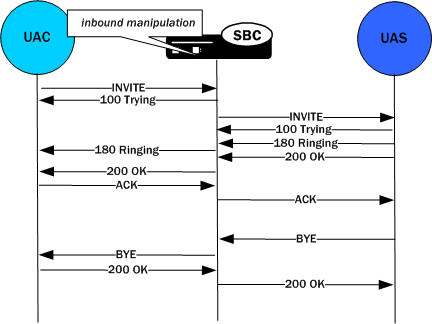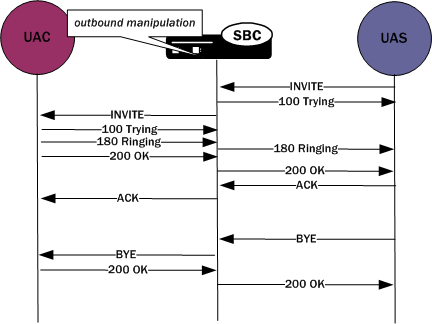Dialog-Matching Header Manipulation
The most common headers to manipulate using HMR are the To-URI and From-URI. Along with the to-tag, from-tag, and Call-ID values, these are also all headers that represent dialog-specific information that must match the UAC and UAS to be considered part of the same dialog. If these parameters are modified through HMR, the results can be that the UAC or UAS rejects messages.
While it is possible to ensure that dialog parameters match correctly using regular HMR, this feature offers a simpler and less error-prone method of doing so.
In addition, this section describes the addition of built-in SIP manipulations defined by Oracle best practices, and a new method of testing your SIP manipulations.
About Dialog-Matching Header Manipulations
The goal of this feature is to maintain proper dialog-matching through manipulation of dialog-specific information using HMR. Two fundamental challenges arise when looking at the issue of correctly parameters manipulating dialog-matching:
- Inbound HMR
- Outbound HMR
The new setting out-of-dialog (for the msg-type parameter) addresses these challenges by offering an intelligent more of dialog matching of messages for inbound and outbound HMR requests. This is a msg-type parameter, meaning that it becomes matching criteria for operations performed against a message. If you also specify methods (such as REGISTER) as matching criteria, then the rule is further limited to the designated method.
For both inbound and outbound manipulations, using the out-of-dialog setting means the message must be a request without a to-tag in order to perform the manipulation.
Inbound HMR Challenge
Because inbound manipulations take place before the message reaches the core of Oracle Enterprise Communications Broker (OECB) SIP processing, the SIP proxy takes the manipulated header as directly received from the client. This can cause problems for requests leaving the OECB for the UAC because the dialog does not match the initial request sent.
The unmodified header must be cached because for any subsequent request (For example, a BYE originating from the terminator. See the following diagram.) the OECB might need to restore the original value, enabling the UAC to identify the message correctly as being part of the same dialog. For out-of-dialog requests (when the To, From, or Call-ID headers are modified) the original header is stored in the dialog when the msg-type out-of-dialog is used.
The OECB performs the restoration of original headers outside of SIP manipulations. There are no manipulation rules to configure for restore the header to their original context. The OECB recognizes that the headers are modified, and restores them to their original state prior to sending the message out. Restoration takes place prior to outbound manipulations so that any outbound manipulation can those headers after they are restored.

Outbound HMR Challenge
When you use the out-of-dialog setting for an outbound manipulation, the Oracle Enterprise Communications Broker executes this specific SIP header rule only if the same SIP header rule was executed against the initial dialog-creating request.
For example, if the INVITE’s To header was not manipulated, it would not be correct to manipulate the To header in the BYE request. To do so would render the UAC unable to properly match the dialog. And this also means that the outbound manipulation should be carried out against a To, From, or Call-ID header in the BYE request if it was manipulated in the INVITE.

Built-In SIP Manipulations
In the course of HMR use, certain rules have become commonly used. Lengthy and complex, these rules do not include any customer-specific information and do they can be used widely. To make using them easier, they have been turned into built-in rules that you can reference in the in-manipulationid and out-manipulationid parameters that are part of the realm, session agent, and SIP interfaces configurations.
Built-in rules start with the prefix ACME_, so Oracle recommends you name your own rules in a different manner to avoid conflict.
While the number of built-in manipulation rules is expected to grow, one is supported at the present time: ACME_NAT_TO_FROM_IP. When performed outbound, this rule changes:
- The To-URI hostname to the logical $TARGET_IP and port to $TARGET_PORT
- The From-URI to the logical $REPLY_IP and port to be $REPLY_PORT